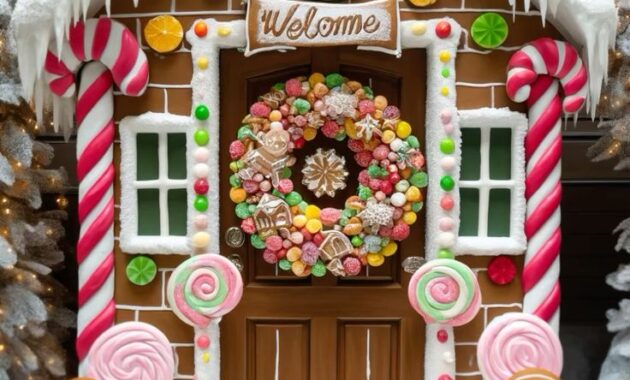The aroma of cinnamon, ginger, and cloves fills the air, a comforting scent that evokes memories of childhood and the magic of the holiday season. It’s the smell of gingerbread, a beloved treat that transcends generations and brings a smile to every face. And what better way to celebrate this festive spirit than with a gingerbread house village, a whimsical and delectable creation that transforms your home into a winter wonderland of edible delight.
A gingerbread house village is more than just a decoration; it’s a captivating centerpiece that captures the essence of the holiday season. It’s a testament to creativity, artistry, and the joy of shared experiences. Each house, meticulously crafted with gingerbread and frosting, tells a story of festive cheer, inviting visitors to step into a world of sugary delights.
This article will delve into the fascinating world of gingerbread house village decorations, exploring the history, techniques, and inspiration behind these edible masterpieces. We’ll uncover the secrets to creating a truly captivating village that will leave your guests in awe and inspire a sense of wonder.
A Journey Through Time: The Evolution of Gingerbread Houses
The tradition of building gingerbread houses dates back centuries, with its roots intertwined with the history of gingerbread itself. This sweet treat, a combination of spices, honey, and flour, has been enjoyed across cultures for millennia. Ancient Egyptians, Greeks, and Romans all had their own versions of gingerbread, using honey as a sweetener and incorporating spices like cinnamon, ginger, and cloves.
The concept of gingerbread houses emerged in Germany during the Middle Ages, where gingerbread was often used to create intricate decorations for festive occasions. By the 16th century, gingerbread houses had become a popular tradition during Christmas, symbolizing the warmth and comfort of home during the winter months.
The famous Grimm Brothers fairy tale, ”Hansel and Gretel,” further cemented the association of gingerbread houses with childhood wonder and the magic of Christmas. In the story, the children are lured into the forest by the alluring aroma of a gingerbread house, showcasing the enchanting power of this sweet treat.
As the tradition spread across Europe and later to the Americas, gingerbread houses evolved from simple structures to elaborate creations, incorporating intricate details and whimsical designs. Today, gingerbread house villages are a beloved holiday tradition, enjoyed by families and communities alike.

Creating a Festive Village: Essential Tools and Materials
Building a gingerbread house village is a fun and rewarding activity that requires some planning, patience, and a touch of creativity. Here are the essential tools and materials you’ll need to get started:
Gingerbread House Kits
For beginners or those short on time, gingerbread house kits offer a convenient starting point. These kits typically include pre-cut gingerbread pieces, frosting, candy, and instructions. The kits are available in various sizes and designs, from classic cottages to charming snowmen houses.
Homemade Gingerbread
For those who prefer to create their own gingerbread, there are countless recipes available online and in cookbooks. A classic gingerbread dough typically includes flour, butter, sugar, molasses, spices, and baking soda. Once the dough is prepared, you can use cookie cutters to create various shapes for your houses, chimneys, windows, and doors.
Frosting
Frosting serves as the adhesive and decorative element in gingerbread house construction. Royal icing, a classic choice for gingerbread houses, is made from powdered sugar, egg whites, and lemon juice. It’s a firm frosting that holds its shape well, making it ideal for intricate details and piping.
Candy and Decorations
The real magic of gingerbread house decorating lies in the candy and decorations you use. Choose from a wide array of candy, from classic gumdrops and sprinkles to more elaborate candies like chocolate coins, candy canes, and marshmallows.
For a whimsical touch, incorporate other decorative elements like edible glitter, sugar pearls, and miniature trees made from frosting or pretzel sticks. You can also use non-edible decorations like miniature figurines, Christmas lights, or snowflakes made from paper or cardboard.
Building Your Dream Village: Step-by-Step Guide
Once you’ve gathered your tools and materials, it’s time to embark on your gingerbread house village construction. Here’s a step-by-step guide to help you build a festive and eye-catching village:
1. Plan Your Village Layout
Before you start building, take some time to plan the overall layout of your village. Consider the size of your workspace and the number of houses you want to create. You can sketch out a simple layout or use a grid paper to map out the placement of each house and the surrounding landscape. Include walkways, paths, and decorative elements like trees, fences, and snowdrifts.
2. Construct the Houses
If you’re using gingerbread house kits, follow the instructions provided. If you’re making your own gingerbread, bake the dough according to the recipe. Once the gingerbread pieces are cool, use frosting to assemble the walls, roof, and other structural elements of your houses. Use additional frosting to create window frames, doors, and chimneys.
3. Decorate the Houses
Let your imagination run wild when decorating your houses. Use candy, frosting, and other decorative elements to add detail and character to each house. You can create candy roofs, frosted windowpanes, gumdrop doors, and candy cane walkways. Use sprinkles to simulate snow on the roofs and create miniature Christmas trees with pretzel sticks and green frosting.
4. Build the Landscape
Create a whimsical landscape for your village using edible elements and other decorative materials. Use graham crackers, pretzels, and wafer cookies to build paths and walkways. Use frosting to create snowdrifts and hills. Incorporate miniature trees, fences, and other decorative elements to bring your village to life.
5. Add the Finishing Touches
Once your village is built, add the finishing touches to create a truly magical scene. You can use edible glitter, sugar pearls, and miniature figurines to add sparkle and charm. Consider adding miniature Christmas lights to enhance the festive ambiance. Be sure to set up your village in a cool, dry place to preserve its freshness.
Beyond the Basics: Creative Ideas and Inspiration
The possibilities for gingerbread house village decorations are endless, limited only by your imagination. Here are some creative ideas to inspire you:
Theme-Based Villages
Create themed villages based on your favorite books, movies, or historical periods. A ”Gingerbread Wonderland” theme could feature snowy cottages, ice castles, and playful penguins. A ”Fairytale Village” could include candy-colored cottages, gingerbread castles, and charming gingerbread animals. A ”Victorian Village” could feature elaborate gingerbread houses with intricate details and delicate decorations.
Interactive Elements
Incorporate interactive elements into your village to engage your guests. Create a miniature gingerbread bakery with a gingerbread ”oven” and various candy treats on display. Build a gingerbread train track with a miniature gingerbread train that runs around the village. Design a ”gingerbread snowman” with a removable hat and scarf that guests can try on.
Edible Landscapes
Transform your gingerbread village into a breathtaking landscape with edible elements. Use chocolate to create a ”flowing river,” pretzels to form fences, and graham crackers to create a ”rocky terrain.” Use frosting to paint a ”snowy landscape” or create a ”starry night” sky with edible glitter.
Personalized Villages
Create a gingerbread village that reflects your personal style and interests. Include your family’s names, a replica of your home, or special symbols that hold significance to you. The village can be a unique and heartwarming tribute to your family and memories.
Tips for Success: Ensuring a Lasting Village
To ensure your gingerbread house village stays fresh and beautiful for the holiday season, follow these helpful tips:
Use Quality Ingredients
Use high-quality ingredients, especially for the gingerbread dough and frosting. This will ensure that your village is durable and stays fresh for longer. Choose fresh eggs for the frosting and ensure that the spices you use are fresh and aromatic.
Keep It Cool and Dry
Store your gingerbread village in a cool, dry place to prevent it from becoming too soft or melting. Avoid exposing it to direct sunlight or heat sources. A cool, dry pantry or a room with a consistent temperature is ideal.
Use a Sturdy Base
Create a sturdy base for your village using a piece of foam board, a large tray, or a wooden cutting board. This will help to prevent the village from shifting or collapsing. You can also decorate the base with edible elements or non-edible decorations to create a cohesive scene.
Avoid Direct Contact with Food
To prevent the gingerbread from becoming soggy, avoid placing edible decorations directly on the gingerbread. Use frosting or a thin layer of edible glue to secure the candy to the gingerbread. This will ensure that the decorations stay in place and that the gingerbread remains crisp.
Be Patient and Have Fun!
Building a gingerbread house village takes time and patience. Don’t get discouraged if your first attempt isn’t perfect. Enjoy the process and embrace the imperfections. The most important thing is to have fun and create a festive and delightful village that you and your loved ones can enjoy.
Beyond Decoration: The Joy of Sharing
The true magic of gingerbread house villages lies not only in their beauty but also in the joy they bring to those who create and share them. They are a testament to creativity, artistry, and the warmth of the holiday season. They invite us to slow down, connect with our loved ones, and indulge in the sweet traditions that make the holidays so special.
Whether you’re building a village with your family, gifting it to a friend, or simply enjoying it as a centerpiece in your own home, a gingerbread house village is a reminder of the joy and wonder that the holidays bring. It’s a sweet and heartwarming reminder that the best things in life are often the simplest ones, shared with those we love.
